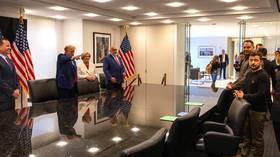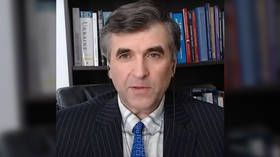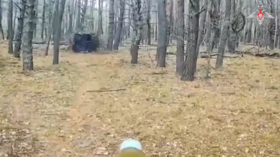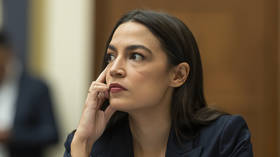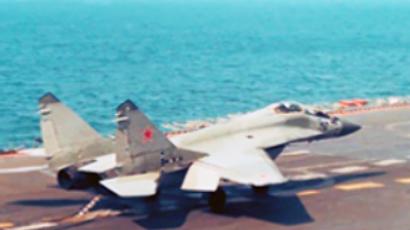I wish Obama every success – Medvedev
Russian President Dmitry Medvedev has said he wants the U.S. President-elect Barack Obama to be a success when he begins his time in office.
During his visit to India, Medvedev he hopes the new U.S. administration to be constructive and reasonable.
The Russian leader was speaking to Vickram Bahl of Indian Broadcasting Corporation Doordarshan on a number of issues, including joint military projects, the easing of visa restrictions and investment into the energy industry.
Question: India and Russia have been friends for a long time, but our relationship has basically been based on the area of defence in the last few years. We have a good civil relationship, regular people to people contact, but the real business between the two countries seems to be in defence. How do you see this relationship of defence business grow in the future and especially now that you are trying to take this into a partnership?
D. Medvedev: Thank you. I will try to tell you the way I see the development of these relationships. But first of all I’d like to express my condolence upon the barbaric terrorist attack which took place in Mumbai. We sympathise with the Indian nation and all the people who were caught in this disaster. We believe that such terrorist attacks are extremely dangerous and destructive for world order. And unfortunately they take many lives as happened in Mumbai. I believe this case will be investigated in the nearest future. But no matter what it finds and no matter who is behind such attacks, they are clearly aimed against the order; they damage the statehood and they are extremely dangerous for the community. For this reason all countries condemn such actions. Russia also joins them in this condemnation and expresses its sincere condolences to all the families of the deceased and to the entire Indian nation. I’ve said this in the telephone conversation with Prime Minister Singh.
Question: Are you planning to collaborate with India in any way in the future concerning the issue of counter-terrorism?
D. Medvedev: Without any doubts, we are willing to have a full scale cooperation with India in all anti-terrorist issues. We do have a very good partnership and a friendly and strategic relationship. We are definitely willing to help our Indian friends in opposing terrorism. This is a threat to us all. Unfortunately, Russia had faced such problems on a number of occasions. The terrorist threat is an unresolved issue for our country as well. Thus we are willing to cooperate in any way possible in preventing such terrorist attacks, and investigating the attack which had just taken place, and creating a global anti-terrorist defence system in the world. I’ve also said this in the telephone conversation with the Prime Minister.
Question: And specifically on the various areas to collaborate with in India and will the relationship be taken further to the level of partnership?
D. Medvedev: In spite of our profound and efficient relationships and serious cooperation, the areas of defence and security and arms supply have always been based on buying and selling principles. We’d like to transfer to a more profound relationship. We have examples of such projects as Brahmos, but this is not sufficient. We hope that we’ll be able to offer new ways of cooperation together with our Indian colleagues. This may include the exchange of technologies and the development of joint industries and other ways of cooperating which would be beneficial for both parties.
At the same time we don’t rule out and even welcome the development of proper trade relationships as far as arms and other areas are concerned. But I believe more profound cooperation and integrated interaction seem very promising. The modern world demands more creative and competitive ways of developing business relationships. Our trade relations have been developing rather well. Last year our commodity turnover was more than 5 billion dollars. I believe this year it will be 7 billion, which is not a bad figure, but considering our potential and the type of relations between Russia and India, this figure seems insufficient. The question is not only about increasing this amount and increasing volumes even though it is important as well. But it is also important to work on the quality of the commodity turnover.
Traditionally Russia has been supplying certain types of arms, machinery and some types of raw materials. In return, India has been supplying food and pharmaceutical goods. I believe we could enrich our commodity turnover with other large projects as well. This advanced structure of commodity turnover would benefit both Russia and India. I hope we will be able to work on
it, even during my upcoming visit to India.
Question: Most of the investment going into India has been in the defence area like BrahMos that you’ve mentioned. One of the areas that have taken off recently has been telecoms. You’re also looking at some other investments such as joint production in aerospace which will probably create some civilian business as well. Are there any other projects that you’re looking at in the future apart from these during your interactions in India?
D. Medvedev: You’ve actually mentioned several new areas of cooperation. I believe cooperation in the areas of high technology such as telecommunications is extremely helpful and beneficial. Our countries have a common ground for interaction in this area. As we know, both India and Russia have a good technology potential in creating new programs, computer developments and work in the Internet. I believe this kind of interaction and projects would be beneficial in the future. I believe our nations have a lot in common from the viewpoint of national creativity, meaning their skills of creative exploration and its implementation in practice. But we should not forget about the large cooperation areas. In particular I cannot help but mention our cooperation in the area of nuclear energy. This area is large, serious and mutually beneficial. I hope that it will be promoted during my visit. By the way, at the same time I’d like to congratulate our Indian colleagues on receiving the relevant approval in the nuclear suppliers group. Now the development of nuclear projects and energy in India will be obviously placed on an industrial basis.
Question: Just going back to the defence area, you have looked at jointly producing fighters. And you’ve also been talking about the possibility of producing tanks in India. There’ve also been talks about leasing nuclear power submarines to India. What exactly is likely to be agreed in the next few months or perhaps even during your visit?
D. Medvedev: We’ve been developing contacts. We have agreements in those areas which you’ve just named. I believe we will keep developing these areas. They are definitely of interest, including construction of the new generation fighter aircrafts which is a good and helpful development. According to our experience, our Indian colleagues are interested in implementing this project. We are also talking about cooperation in the area of leasing the nuclear submarines. This is also an important and highly technological area of cooperation. And we are willing to move to the full extent in relation to other areas. These areas will cost a lot of money, but considering the interest of our Indian colleagues in this range of issues and the capability of the Russian Federation, we are willing to extend our cooperation in this area as well.
Question: As for contracts, there’s one that is still pending. I refer to the aircraft-carrier cruiser Admiral Gorshkov that has gone over-budget. What is happening on that front, how do you see it resolved?
D. Medvedev: This is not the simplest issue in our relations, but I don’t see this situation as extraordinary. I believe both our countries just have to give consideration to this project and to agree on the final cooperation parameters, and to imply it fully.
Question: Talking of BrahMos, there has been talk of exporting missiles to friendly countries so that the corporation which is a private entity can function as a private entity. But obviously, it’s not so easy. Do you think BrahMos will be exported to other friendly countries?
D. Medvedev: This issue demands a clear mutual understanding at least. We are all tied by the international obligations. What we do for each other fits within those international agreements which we’ve reached. As far as the supply of goods to third party countries is concerned, it has to be done first of all in accordance with the international agreements which are mandatory for the Russian Federation as well as for India, including those on non-proliferation of nuclear weapons and other issues associated with arms supply. We definitely don’t rule out the opportunities of proper legal cooperation in those cases when we fit within the legal framework. Let me emphasise again that we have to be very considerate towards each other’s positions in these very sensitive issues. They require verification.
Question: President, what about another issue of submarines. There was a very unfortunate accident on one of Russia’s nuclear submarines recently. Has that affected your possible negotiations with India for leasing or sale?
D. Medvedev: I hope it will not affect our relationships negatively. According to the information which we have at the moment, this sad incident which is being investigated now, had unfortunately happened due to the so-called human factor, i.e. the inefficient preparation of a number of crew members. This incident doesn’t bear witness to the condition of this project and this nuclear submarine. Nonetheless we will hold a proper investigation and we will make the results of it public.
Question: In the private sector, when you talk of increasing business and people to people relationships, one of the impediments has been the visa application system. Visas to Russia are very difficult to get, they are not multiple entry, and this is affecting in particular small and medium enterprises – people who want to just fly to Russia and explore business opportunities. Are you looking at perhaps easing those regulations?
D. Medvedev: I believe we have to do our utmost to simplify the visa regime. We’ve loosened up visa conditions for India already. People with diplomatic and officials’ passports basically travel without obstacles. Nonetheless, other than diplomats and government officials, there is a large and extremely important group of people who have to travel between Russia and India quite often. I am talking about businessmen. I believe we could make a certain document on visa benefits or on loosening the visa regime in order to enable Indian businessmen and Russian entrepreneurs to travel with less effort and formalities. I believe this would be beneficial for our countries and the business community.
Question: The other area is information… How can businessmen from Russia and India get information about each others activities? Are you planning to build an information centre about Russia in India, or make some other steps to connect businessmen from the two countries?
D. Medvedev: It’s a very good subject. As a rule, business should be well-informed but far from all small or mid-size enterprises are in a position to get fundamental reports about the activities of certain companies. In order to make our markets more open to each other, it would certainly be interesting to create an information centre or a database that will accumulate information about potential partners, especially, given the fact that today we may have access to the Internet and other means of communication. If such an information centre is to be created, then, I think, it should be done within the framework of the Russian-Indian Business Council.
Besides, the maximum information on possible partners should be included in this database. Moreover, this system should be open, and anybody interested in developing contacts with Indian partners should have an opportunity to enter this database, get registered and leave information. Without that no progress can be made and no full-fledged contacts can be established.
Question: On the issue of energy India is looking at Russia not only in the nuclear area, but also in oil and gas. What is the road map you see for further Russia-India relations in this sector? What do you think about the future of the nuclear deal between the two countries? And also are you planning to let Indian companies take part in oil and gas exploration in Russia?
D. Medvedev: You’ve just given an example of what we already have. I think these are good projects. If we speak about the Sakhalin project in which the Oil and Natural Gas Corporation (ONGS) is taking part, it’s a big project which, I think, is mutually beneficial. I hope that our Indian partners are also satisfied with the level of this cooperation. As for cooperation in nuclear energy, I think that the Kudankulam nuclear facility, which you’ve just mentioned, speaks for itself. We hope that soon we will be able to launch new projects exactly in the sphere of nuclear energy.
Anyway, we have a direct interest in that and to the best of my knowledge our Indian partners also have full interest in this cooperation. As far as new projects are concerned, you’ve spoken about a Russian company in which India has recently invested its capital. I believe that you may already know that the Russian anti-monopoly service has agreed to this kind of deal. Our Indian partners can obtain rights and implement projects within the framework of this company. But, naturally, we don’t exclude other spheres of cooperation. Therefore, when you speak about a roadmap plan, I think that this roadmap can contain all routes and directions, including traditional gas and oil, and also nuclear energy.
Question: On the issue of a multi-polar world where we have a voice for every country, which you were talking about… Can Russia and India collaborate in achieving this goal?
D. Medvedev: India and Russia already make this multi-polar world because we are fast-developing and big – India is very big- countries. They are creating this multi-polar world that should be our goal. It would be impossible for the development to concentrate only in one part of our planet or in one particular country just as it would be impossible to imagine another situation when global decisions are taken exclusively by one state, even if it’s strong, powerful and respected. But if it’s so, we should set up a multi-polar world both politically and economically. If we speak about political multi-polarity, the existence of such basic institutions as the United Nations, various regional associations, including the Shanghai Cooperation Organization (SOC) in which India has an observer status, and other regional organisations, provides an opportunity to step up cooperation within the BRIC group that comprises the world’s four fastest-developing economies. All these components are elements of a multi-polar setup. In this sense, we believe that we cooperate with India as fully as with a vital foreign policy partner. If we take the economic aspect, these are diverse economic constructions.
Today, we cannot even imagine that India or Russia will be excluded from discussing some vital global issues. Not so long ago, during the recent meeting in Washington, we discussed joint efforts that should be taken to overcome the consequences of the financial crisis which today is paralysing the financial systems of many countries. It’s absolutely clear that no result will be reached without cooperation, mutual cooperation, with India. Therefore, I understand multi-polarity as the only means to do business and the only means to develop relations in modern conditions when various poles interplaying with each other, form both an international agenda and create a tissue of international relations. India occupies its own vital place in this process.
Question: Are you going to be looking for the support of India concerning the recognition of independence of Abkhazia and South Ossetia after the August crisis in Georgia?
D. Medvedev: At the very beginning when decisions were made to recognise Abkhazia and South Ossetia as independent states, I formulated the position of the Russian Federation. It consists of the following. We took that step. It was not easy. But our decision is final. We are going to help these states and develop contacts with them in all spheres; we will also welcome if other countries establish diplomatic relations and maintain economic ties with these states. But, certainly, we are not going to exert pressure on anybody. In this sense, our position is very constructive. Yes, we think that these states have emerged and have become subjects of international law but a decision of whether to recognise or not recognise or support or refuse to support these states should be made by other countries, and in this sense we are not imposing our viewpoint on anyone.
Question: What are your expectations from the new U.S. President Barack Obama?
D. Medvedev: Let the U.S. president-elect get down to his job. Until that happens, it would be guess-work to predict how he will build his work, what achievements will be made and whether they will be able to overcome the financial crisis and resolve a number of critical situations that concern primarily the United States, such as Iraq, Afghanistan, etc.
But, anyway, we expect that the new U.S. administration and the new president of the United States will take a constructive and reasonable approach and demonstrate the will to search for a compromise on the most difficult topics. What we’ve recently heard from Washington makes me feel cautiously optimistic. But, it’s not only words but also deeds that matter in politics. Therefore, we are waiting for the new U.S. administration to be shaped and we wish success to this new administration. I wish personal success to the new president of the United States. All the rest remains to be seen.
Question: Are we heading for a different version of a Cold War?
D. Medvedev: I don’t think that we are moving towards any new version of the “cold war”. Anyway, I wouldn’t like that at all. We really found ourselves in a situation when we heard several tough statements from our partners. They were talking about some restrictive measures, but, in my view, all those discussions didn’t lead them anywhere, in the first place, and they simply couldn’t have because attempts to isolate someone, especially a country like Russia, are doomed to absolute failure. But if it’s so, all talk about any kind of a new war looming or a curtain falling is senseless and unproductive.
Moreover, I would say that there are no ideological grounds for this confrontation. In the past years there were at least ideological reasons, such as the existence of the two worlds and the two systems which competed against each other. Today, we have the same values and our task is to seek a common understanding of these values. And that’s the most complicated task!
Question: Vladimir Putin was a very successful president. You are seen as his successor and people have great expectations about you and have expected you to follow his lead. So what are you planning to do to achieve even more with Russia?
D. Medvedev: The activities of each president, of each new leader of a country, is always different from those of his predecessor. Despite the fact that I have very friendly special relations with my predecessor – the former president and the incumbent Prime Minister Vladimir Putin – it’s absolutely clear that he has his own responsibilities and I have to do my own job. It’s true that in the eight years of Putin’s presidency the country achieved good results at home and improved its international image. My task is to sustain and develop this success, elevate the country to a new level and quality of domestic life, improve living standards, overcome the consequences of the financial crisis, under the current circumstances, and strengthen this country’s international image. Therefore, these tasks don’t change. Methods, tactics and sometimes style can change, but the tasks always remain unchanged. And it’s going to be a success, if we manage to achieve these goals. That, I think, will provide an answer to your question.
Question: And what about taking relations with India further? You’ve never been to India before, so what is your attitude to this country?
D. Medvedev: You know, I have a big and genuine interest in travelling to India because it’s not only a country which is very close to and friendly towards Russia; it’s also a country of ancient culture, a unique country inhabited by talented people. Whenever you are going to pay your first visit to such a country, you always have genuine interest. It so happened that I haven’t had a chance to visit India as of yet, not as a tourist or for any official purpose. Therefore, my interest is being heated up by these circumstances. But apart from my human interest, I think that we will be able to make progress in all areas of cooperation. I expect my talks with my Indian counterparts to be fruitful and productive, and also extremely interesting. Therefore, I am looking forward to this visit and will be glad to come to your country.
Question: And the recent terrorist attacks didn’t make you change your mind?
D. Medvedev: Had we thought about the consequences of such attacks, or even be afraid of them, it would have meant only one thing – that the terrorists achieved their true goals. And that would have been the worst of all possible responses. Therefore, despite any circumstances, we want to develop relations with India, and our delegation will soon be your guests.




